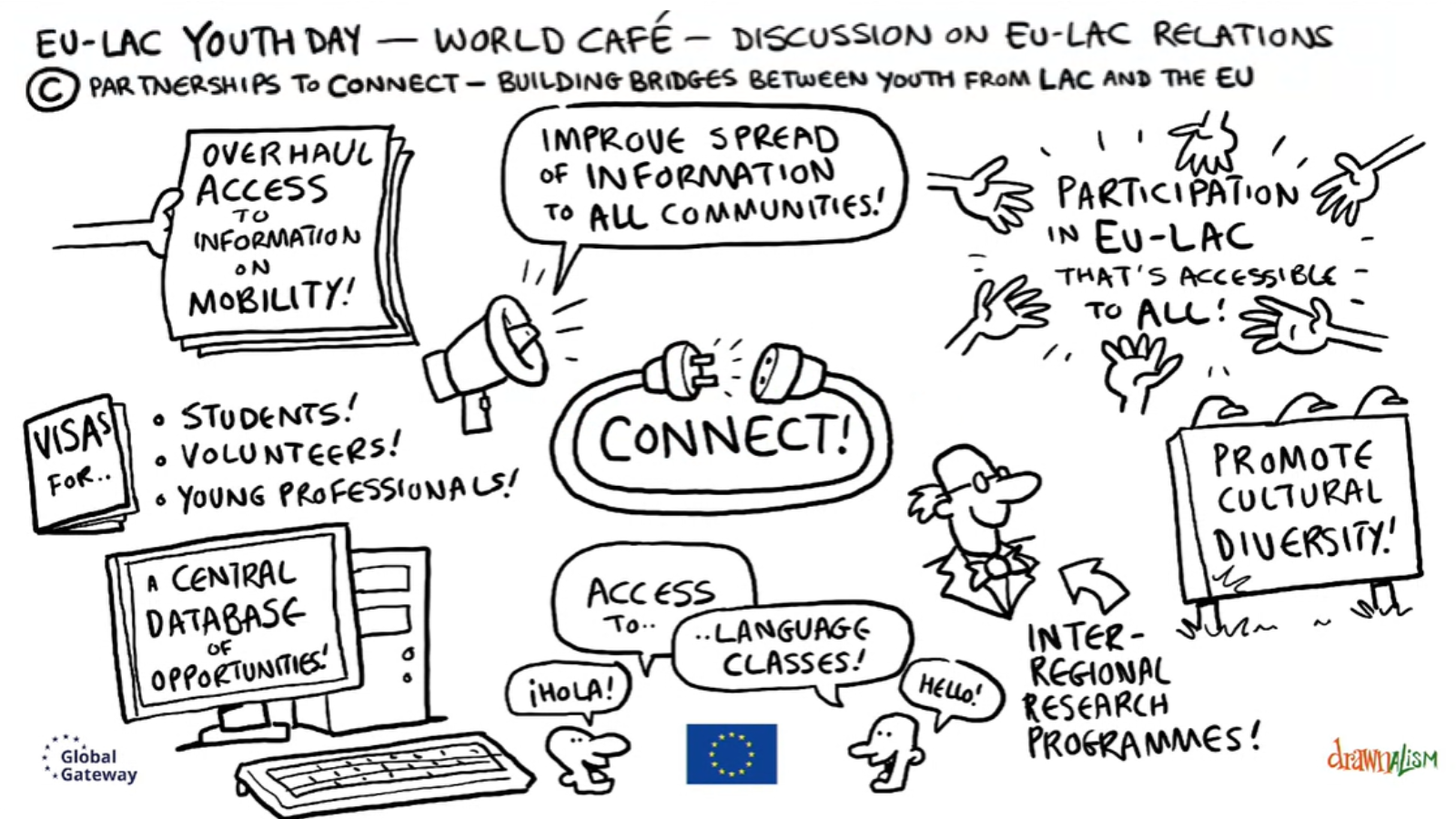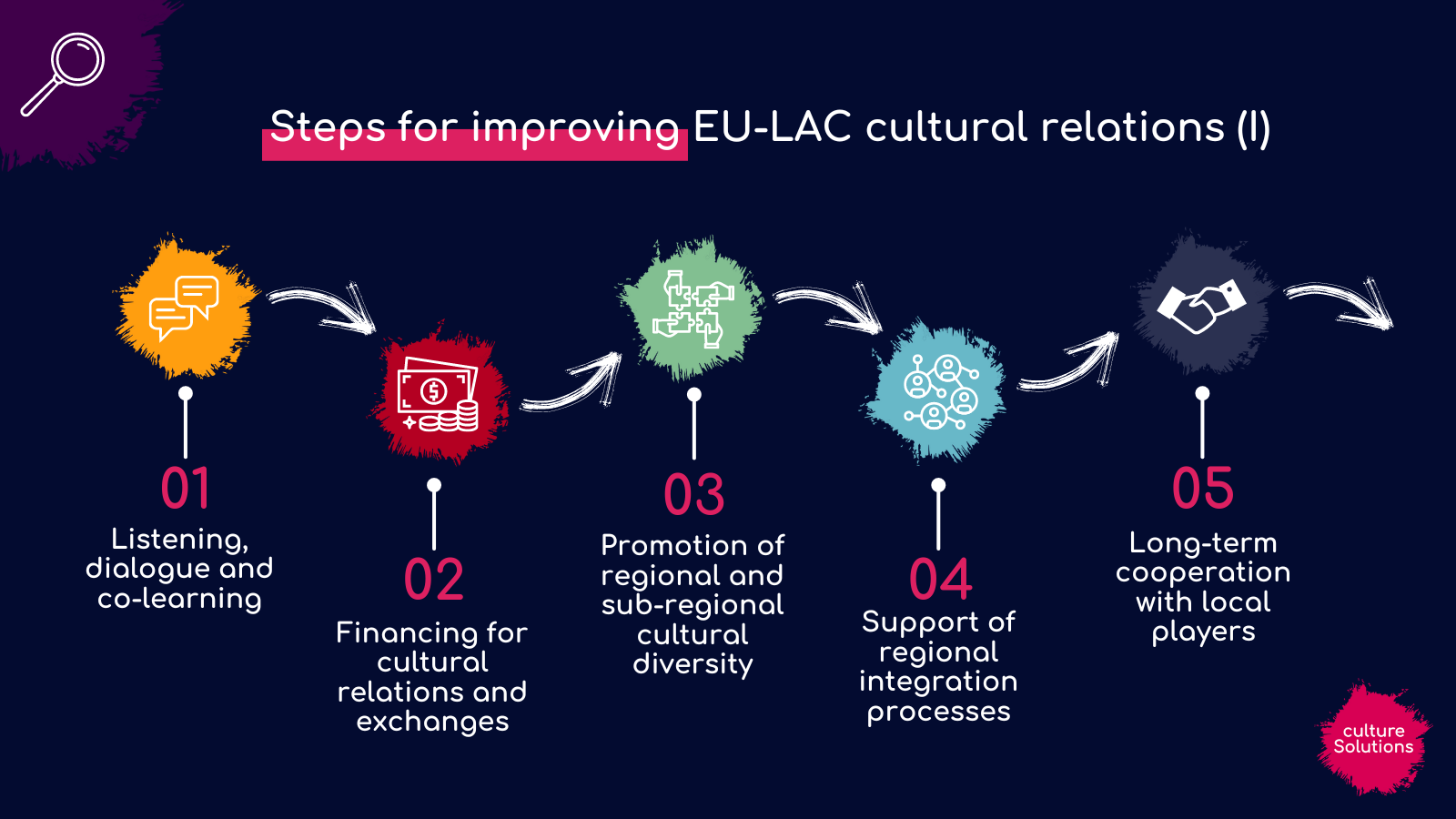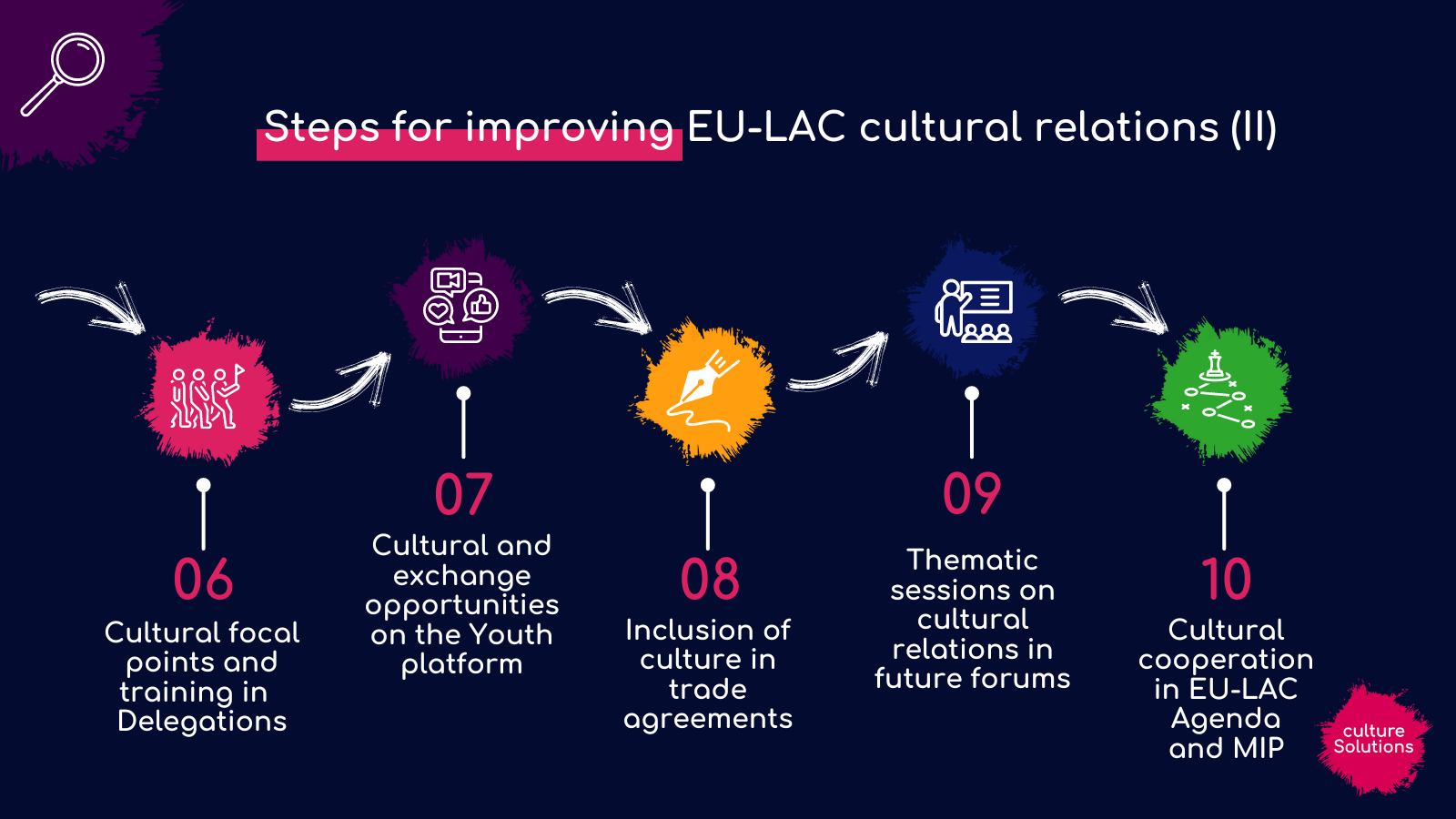Rejuvenating EU-LAC cultural relations from the bottom-up
By Ina Kokinova
Following the examination of the official-level cultural diplomacy between EU and Latin American and Caribbean countries, this second blog post moves on to uncover the flourishing collaboration at the grass-roots level. Drawing from the key take-aways of the EU-LAC Forum that took place a few days before the EU-CELAC Summit, the analysis proposes a list of recommendations for strengthening bi-regional cultural relations.
EU-LAC Forum: the mountains supporting the Summit
In a warm-up to the EU-CELAC Summit on 17 and 18 July 2023, European Commission’s DG INTPA led the organisation of the EU-LAC Forum “Partners in change” on 14 and 15 July as a listening exercise and a space for engagement with non-state actors. The event gathered youth, civil society and local authorities from the EU and LAC, both in person and online, demonstrating that bi-regional relations have not only survived but even burgeoned during the 8 years without political will and top-level Summits. With networking and other side events standing out as an excellent opportunity for establishing or deepening contacts and potentially partnerships, the Forum itself was an important occasion for EU international cultural relations.
The densely packed programme provided a platform for a wide range of groups, from activists, artists and influencers, to refugees, feminists or politicians. This balanced representation pointed to the unique benefits of co-creating the sessions with partners from the sector. However, having to fit a large number of speakers into brief panels often resulted in a short time for exposition per person, with limited or no reaction or exchange with the rest of the speakers or the audience. As the young climate activist Francisco Vera put it, dialogue is not about one group speaking and the other one listening, but rather about exchanging ideas and co-designing solutions to common problems.
Three priority areas for cooperation
Throughout the two days of discussions, some topics were brought up again and again by different speakers, and also featured prominently in the Forum recommendations. The participants insisted on the proposals being presented to the EU-CELAC leaders with the aim of informing their decisions but also establishing follow-up mechanisms, and received reassurances to that end with the ultimate goal of transitioning from consultative to binding inputs. Culture is closely interrelated with each of these areas of interest.
1. Youth, including employment, education and exchange opportunities
Young people were the undeniable silver lining of the Forum. With more than 160 million 15-29 year-olds, Latin America is a young continent not only in terms of numbers but also due to the disruptive power of youth. They were (self-)identified as drivers and agents of change, vindicating their say in decision making as a legitimate actor like any other citizen, but also involvement in action and leadership on the ground. The audience was reminded of the heterogeneity of youth, with their interests and needs varying despite the commonly perceived monolithic image. However, economic concerns emerged from the Latinobarómetro as the common denominator among LAC young people, while climate change sustained the trend of barely garnering 1% of votes.
In that regard, the working group “Connect” urged the EU to create a centralised database of youth opportunities, such as mobility, education, volunteering and jobs, and the Delegations to LAC countries to disseminate offers beyond those financed by the European Union. Promotion of cultural diversity, better access to language learning and joint research were also suggested. In a similar vein, the group “Engage” included among its proposals the establishment of an EU-LAC youth network and the strengthening of cultural exchanges. During the presentation of ideas, the attendees applauded the remark that LAC youth is not a mere recipient but can also give to the European Union, in particular in terms of linguistic diversity and crafts.
At the end of the half-day entirely dedicated to Youth, Jutta Urpilainen, Commissioner for International Partnerships, shared that she made youth her priority when assuming the post 3 and a half years ago as a consequence of her past youth activism, thus underscoring the importance of political leadership in cultural relations. Her intervention highlighted both recent policy developments such as the Youth Sounding Board and Youth Action Plan, and long-standing success stories like Erasmus+, and announced the forthcoming launch of a youth fund that is going to support grassroots initiatives.
2. Social equality and inclusion, with emphasis on women and indigenous populations
The LAC region was described as troubled by persisting divides and new challenges, such as digitalisation and mental health; and a fatigue with action plans led to advocating it is high time for action. Attention was called to (irreversible) inequality in terms of both economic conditions and Human Rights. For the new social contract (invoked by the Minister of Foreign Affairs Spanish José Manuel Albares) to work, gender equality and indigenous empowerment are key. In the realm of culture that could comprise female-led creative enterprises, as well as indigenous knowledge and crafts, for instance for environmental preservation. Considering that Latin America and Europe are leading in feminist foreign policy, there is ample room for bi-regional cooperation.
The readiness of the Txai Suruí, representative of the indigenous communities, to share their traditional techniques and appreciation of the Earth stressed once again the need for a decolonised dialogue between equal partners. In a nod to such requests, Jutta Urpilainen’s announcement of 45 billion EUR earmarked under the Global Gateway, to be implemented through a Team Europe approach, for social cohesion and equality indicated that soft connectivity complements investment in infrastructure and local needs are starting to be accounted for.
3. Green and digital but just transition
Civil society (for instance INJUVE – Spain’s Youth Institute) repeatedly cautioned against Global Gateway’s threat of replicating existing power asymmetries and asked for rooting it in social impact. Abandoning extractivist and Euro-centric attitudes and fighting corruption were emphasised as the way to ensure no one is left behind in the green and digital transitions. The dangers of technology, including Artificial Intelligence, such as precarious work and increasing divides, may also translate into creative divides between and within countries. Agreeing that technology is not a panacea, some speakers reiterated the importance of in-person activities (e.g. education and cultural exchanges), while others suggested moving from consumers to digital citizens.
Culture: ever-present at the international Forum
Culture was present at the event not only as underlying values and behaviours, but also in its more traditional form of artistic expressions. The cultural part included a photo exhibition on youth opportunities, a performance of the Cuban singer Yarima Blanco in the framework of the programme Transcultura, and the screening of documentaries, such as “The Illusion Of Abundance”. Graphic illustrations accompanied the presentations of the proposals elaborated by the youth working groups.
Beyond the official programming, the indigenous activist Txai Suruí opened her speech with a performance aimed at helping the audience to understand her culture. On a more anecdotal note, one of the Latin American speakers, Max Trejo, was requested to “calm down” in an apparent attempt to allow simultaneous interpretation to catch up with his fast speaking.
On the sidelines, the Commissioner for International Partnerships received artwork as a goodbye gift from the outgoing Youth Sounding Board. The Cultural Relations Platform and EEAS discussed culture in international relations with young opinion leaders.
Recommendations for sustained and sustainable cultural relations
Keeping in mind the priorities set by youth and civil society, taking advantage of the current momentum for political engagement between the EU and LAC, and operationalising the promises on cultural relations requires policy-makers on both sides of the Atlantic Ocean to:
- Engage in genuine, de-colonial and frequent listening, dialogue and co-learning between equal partners, with representatives of all levels of society and sectors of activity, while ensuring the necessary monitoring and evaluation of proposals’ implementation;
- Allocate financing explicitly earmarked to cultural relations, in particular addressing the three priority areas identified above as well as exchanges and mobility more broadly, within the framework of existing funding instruments, such as Global Gateway, NDICI, or Erasmus+, and as a stand-alone cultural cooperation programme for LAC countries, while tying culture to global challenges such as sustainable development, digitalisation, mental health, equality, inter alia;
- Recognise, preserve and promote the cultural diversity of the region (also acknowledging the cultural specificities of the Caribbean region) – with 33 countries, 5 official European languages and numerous indigenous tongues and populations, it is essential to tailor initiatives to the local realities, involving actors on the ground and specifically including diversity among the project’s objectives;
- Support the different regional and sub-regional integration processes and explore synergies with wider EU-LAC cooperation, in particular in cultural fields;
- Favour long-term cooperation between diplomatic staff and local and global players in the cultural scene (including national cultural institutes, UNESCO, EUNIC clusters, civil society and individual artists, as well as private sector) rather than one-off showcasing cultural events (e.g. film screenings);
- Equip EU Delegations in LAC with cultural focal points, provide staff training on cultural relations, and follow up on the creation of country Youth Sounding Boards;
- Feature opportunities for cultural exchange and co-creation on the Youth platform and promote its usage locally to garnish wide reach including among traditionally marginalised communities;
- Include in trade agreements the appropriate provisions on the promotion of trade in cultural goods and services;
- Programme thematic sessions on international cultural relations in future forums, considering the existing demand among participants and the need for frequent encounters;
- Review the EU-LAC Agenda and the (multi-)annual programme(s) to incorporate more substantive and detailed commitments to cultural cooperation.
The views expressed in this article are personal and are not the official position of culture Solutions as an organisation.
Photo credit: Screenshot of the illustration of the group “Connect” taken during the EU-LAC Forum.




